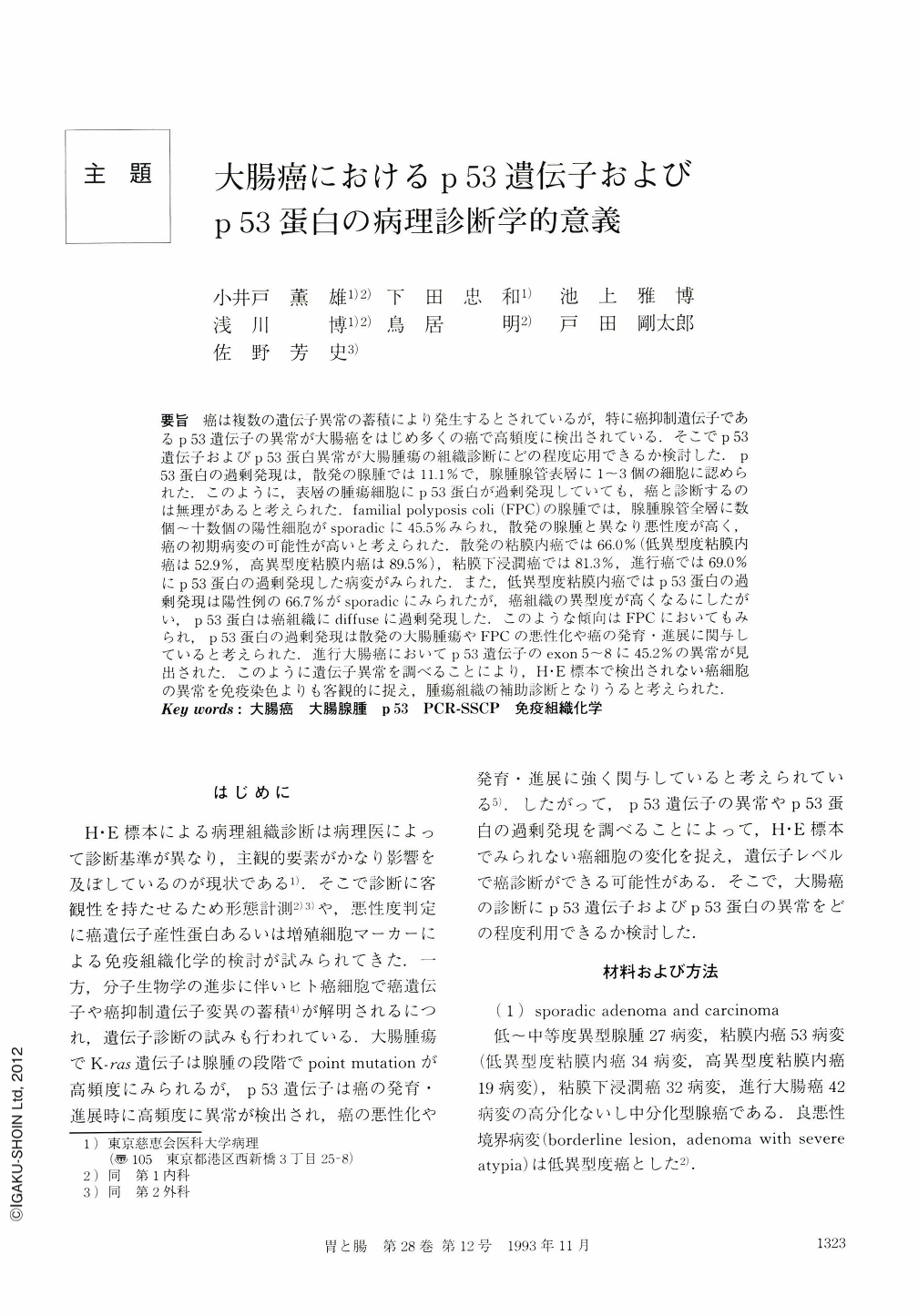Japanese
English
- 有料閲覧
- Abstract 文献概要
- 1ページ目 Look Inside
要旨 癌は複数の遺伝子異常の蓄積により発生するとされているが,特に癌抑制遺伝子であるp53遺伝子の異常が大腸癌をはじめ多くの癌で高頻度に検出されている.そこでp53遺伝子およびp53蛋白異常が大腸腫瘍の組織診断にどの程度応用できるか検討した.p53蛋白の過剰発現は,散発の腺腫では11.1%で,腺腫腺管表層に1~3個の細胞に認められた.このように,表層の腫瘍細胞にp53蛋白が過剰発現していても,癌と診断するのは無理があると考えられた.familial polyposis coli(FPC)の腺腫では,腺腫腺管全層に数個~十数個の陽性細胞がsporadicに45.5%みられ,散発の腺腫と異なり悪性度が高く,癌の初期病変の可能性が高いと考えられた.散発の粘膜内癌では66.0%(低異型度粘膜内癌は52.9%,高異型度粘膜内癌は89.5%),粘膜下浸潤癌では81.3%,進行癌では69.0%にp53蛋白の過剰発現した病変がみられた.また,低異型度粘膜内癌ではp53蛋白の過剰発現は陽性例の66.7%がsporadicにみられたが,癌組織の異型度が高くなるにしたがい,p53蛋白は癌組織にdiffuseに過剰発現した.このような傾向はFPCにおいてもみられ,p53蛋白の過剰発現は散発の大腸腫瘍やFPCの悪性化や癌の発育・進展に関与していると考えられた.進行大腸癌においてp53遺伝子のexon5~8に45.2%の異常が見出された.このように遺伝子異常を調べることにより,H・E標本で検出されない癌細胞の異常を免疫染色よりも客観的に捉え,腫瘍組織の補助診断となりうると考えられた.
Multiple clonal genetic alterations accumulate during the development of tumors. It is now widely accepted that genetic alterations of the p53 gene occur in colorectal tumors and a wide variety of human tumors. Based on this facts, we investigated the mutation of the p53 gene and the accumulation of p53 protein to see how useful it would be for the histological diagnosis of colorectal tumors.
Overexpression of p53 protein was detected in 11.1% of sporadic adenomas. A few positive cells were scattered on the surface of adenomatous glands. However, it was difficult to diagnose carcinoma by such patterns of sporadic distribution. In familial polyposis coli (FPC), 45.5% of adenoma with moderate atypia showed overexpression of p53 protein. Also, it was found that several positive cells were scattered in the whole axis of adenomatous glands. It was suggested that adenoma in FPC had malignant potential and might be regarded as premalignant lesion. Accumulation of p53 protein was detected in 66.0% of sporadic intramucosal carcinomas (52.9% of low grade intramucosal carcinomas, 89.5% of high grade intramucosal carcinomas), 81.3% of submucosal carcinomas, 69.0% of advanced carcinomas. Overexpression of p53 protein was detected diffusely in carcinomas with histological high grade, and sporadic patterns were detected mainly in adenomas and carcinomas with histological low grade. This tendency was almost the same in FPC. These results suggests that overexpression of p53 protein plays an important role in development and deeper invasion of sporadic colorectal carcinomas and FPC. Mutations of p53 gene (exon 5-8) were detected in 45.2% of sporadic advanced carcinomas. The study of the p53 gene will lead to important information concerning clonality and progression among colorectal carcinomas. In the future, this information will be of help for histological diagnosis of malignancy, and for prognosis of tumors.

Copyright © 1993, Igaku-Shoin Ltd. All rights reserved.


